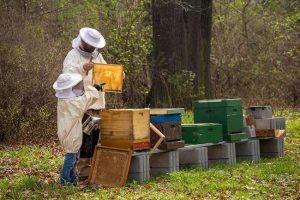Health, News & Press
Will there soon be genetically modified honey in the EU?

Feb
In 2011, the European Court of Justice issued a ruling that strengthened the rights of consumers and beekeepers with regard to genetically modified honey: honey containing traces of genetically modified plants and pollen had to be strictly tested before it was authorised. However, in January 2013, the EU Parliament reversed this decision.
In mid-January, the EU Parliament approved an amendment to the Honey Directive proposed by the EU Commission. This states that pollen is a natural component of honey and is not a separate ingredient of honey. This amendment would mean that it would no longer be necessary to state whether pollen and nectar in honey come from genetically modified plants.
This could mean that Canadian honey, for example, could be sold on the shelves without any reference to genetic engineering, even if the honey comes exclusively from fields with genetically modified plants. An investigation by the magazine Öko-Test has shown that pollen from genetically modified plants can already be found in honey. This included genetically modified rapeseed from Canada, the largest country for the cultivation of genetically modified rapeseed, as well as Roundup Ready soya (GM soya) from South and Central America.
Beekeepers' associations are calling on their members to label their honey themselves and to label their honey jars with the words "Ohne Gentechnik" (GMO-free). Beekeepers can have their honey checked to ensure that it is not contaminated with GM plants.
If you want to be on the safe side, you can also choose Demeter-quality honey. Demeter beekeepers not only strictly reject genetic engineering, but also ensure a natural and rich collection environment for the bees. The artificial breeding of queen bees and instrumental insemination are also rejected.
"This decision serves the genetic engineering lobby, takes away consumers' freedom of choice when buying honey and aims to render beekeepers defenceless in the fight against genetic engineering," says Thomas Radetzki, CEO of Mellifera. Mellifera is committed to sustainable and organic beekeeping and works together with Demeter, among others.
If you want to avoid genetic engineering in honey, you should buy your honey from a beekeeper you trust. If you live in the city, you can also find good honey at markets and health food shops. And if you want to support Mellifera, the bees and GMO-free honey, you can here join in. Foodwatch, the courageous consumer organisation from Germany, is also campaigning for the clear labelling of GM ingredients in food, here you can make a contribution with your signature.